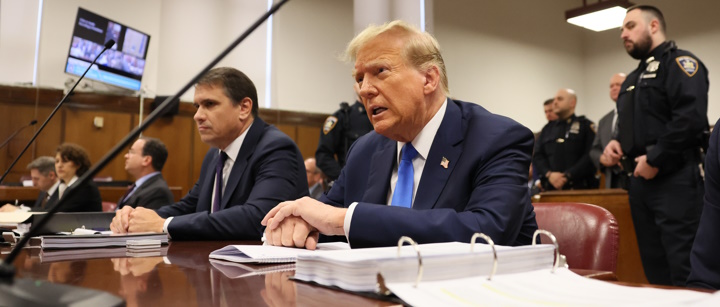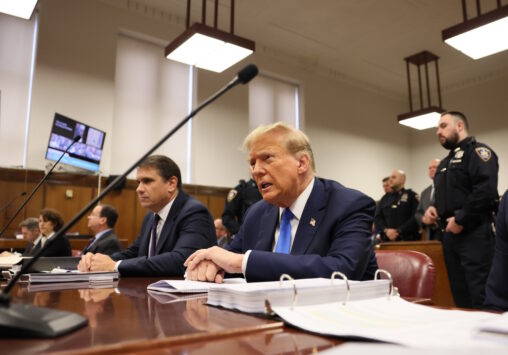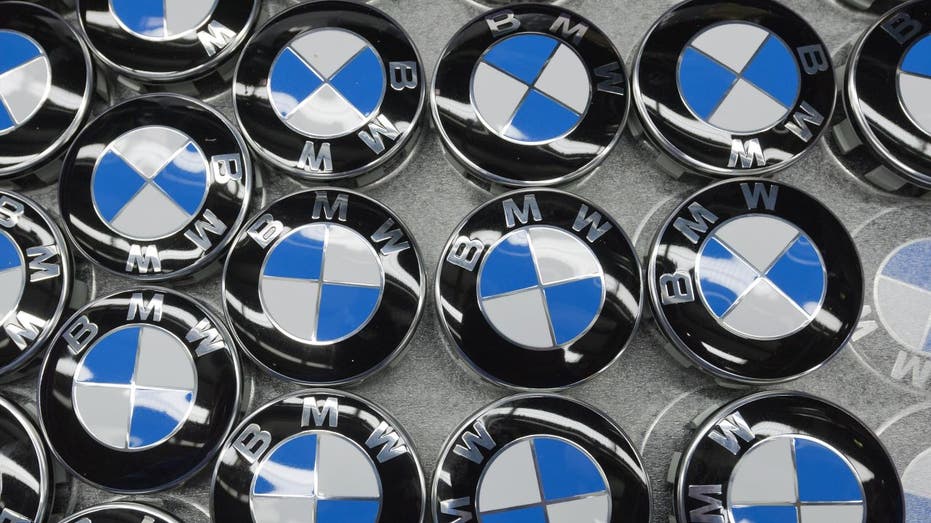
Este artículo estará disponible en español en El Tiempo Latino.
Quick Take
The judge in the criminal trial of former President Donald Trump denied a defense request to ask jurors about their party registration, so their political affiliation is not known. But conservative commentator Tucker Carlson made the unsupported claim in a Facebook post that the jury was “stacked with Biden voters.” Both sides had the opportunity to reject jurors.
Full Story
On May 30, former President Donald Trump was convicted in Manhattan on 34 felony counts of business fraud. (For more about the conviction, read our article “Q&A on Trump’s Criminal Conviction.”) As with all criminal prosecutions, the jury had to be unanimous in its verdict to find Trump guilty on each count.
Close to 300 people were initially screened as potential jurors and alternates, according to NPR. Dozens were dismissed after telling the court they could not be impartial, as the BBC reported, and those who remained were “grilled on 42 questions in the jury questionnaire, including on their news-reading habits, whether they had attended any Trump rallies or read any of the former president’s books.” A panel of 12 jurors and six alternates was finalized on April 19 after four days of selection.
In a letter attached to the questionnaire, acting Justice Juan Merchan of the New York Supreme Court told lawyers for both sides that the jurors could not be asked about their party affiliations.
Merchan, April 8: Please note, there are no questions asking prospective jurors whom they voted for or intend to vote for, or whom they have made political contributions to. Nor are jurors asked about their specific political party registration, though the answer to that question may easily be gleaned from the responses to the other questions. Counsel is forewarned not to seek to expand the degree of intrusion beyond what is relevant and has already been approved.
“Contrary to defense counsel’s arguments,” Merchan went on to say, “the purpose of jury selection is not to determine whether a prospective juror likes or does not like one of the parties. Such questions are irrelevant because they do not go to the issue of the prospective juror’s qualifications.”

But conservative political commentator Tucker Carlson posted an unsupported claim on social media that the jury was “stacked” with people who voted for President Joe Biden.
In a June 13 Facebook post, Carlson claimed, without evidence, that “Trump was found guilty by a jury stacked with Biden voters…” The post received more than 98,000 likes as of July 10.
In the midst of jury selection, conservative political activist Laura Loomer made a similar claim. She posted on X, “Today, on day 2 of jury selection, six jurors were chosen for Trump’s trial. Several are open Biden supporters. RIGGED TRIAL!” Her post, uploaded on April 16, received more than 15,000 likes.
The claims about the jurors’ political leanings are unsupported, however. As we explained, the judge did not allow jurors to be questioned about political affiliation, so that information was not made public, and they were screened in an attempt to ensure their impartiality.
How Jurors Were Selected
Jurors were selected from Manhattan, where the Trump Organization is located, the business fraud occurred and the indictment was filed. Trump argued that it would be impossible for him to get a fair trial in the heavily Democratic borough, but his lawyers failed to convince a federal judge to move the case to federal court – which could have given Trump “a broader, more politically diverse jury pool,” as the Associated Press explained.
During the jury selection process, potential jurors were “grilled on their social media posts, personal lives and political views as the lawyers and judge search for any bias that would prevent them from being impartial,” the Associated Press reported.
Furthermore, Trump’s legal team had the ability to challenge jurors who they felt were unfit to provide impartial judgment and reject up to 10 jurors without cause.
“Prospective jurors can be dismissed by the judge for cause if he finds they shouldn’t serve on the panel,” as CNN reported. “Prosecutors and Trump’s defense team will also get 10 peremptory strikes they can use to remove a juror from the pool, no questions asked.”
Trump claimed that 10 strikes were not enough to ensure a fair jury.
During the selection process, Vox reported, “Potential jurors have been asked to read out or explain posts or memes they’ve shared, and at least one was dismissed for sharing a post that included the words ‘lock him up,’ in reference to Trump.”
Two jurors were dismissed after expressing that they could not provide a fair judgment. The New York Times reported, “One seated juror said she had developed concerns her identity could be revealed. The second was dismissed after prosecutors raised concerns about his credibility.”
What We Know About the Jurors
The decision not to disclose the jurors’ names was made by both prosecutors and Trump’s defense team. In March, Merchan accepted prosecutors’ argument that most information about the jurors should be sealed, and Trump’s lawyers largely agreed.
And, as we said earlier, jurors could not be asked about their party affiliations and voting habits during the jury selection process.
But information about their jobs and thoughts about the trial have been published in news articles, including in the New York Times and the Guardian. Information made public included their sources of news, levels of education, marital statuses and areas of residence. All jurors pledged to remain fair and impartial.
Cynthia Godsoe, a professor at Brooklyn Law School, told us in an email that there is “no validity at all to the claim that [the jurors] were biased. The defense had ample opportunity to question the jurors, research their social media (in fact several were dismissed for things they said there) and exercise the usual amount of challenges (peremptory and for cause) to get rid of jurors they didn’t want.”
“No jury can be totally free of opinions, [especially] in a high-profile case like this, and the question really is, can the juror be fair and impartial,” Godsoe said. “Those left on the jury passed this test for the judge and, more importantly to Trump’s after-the-fact complaints, to HIS own lawyers.”
Lawyers are typically barred from asking jurors about their political party and religion, Godsoe explained, stating that ballots cast in U.S. elections are always anonymous and no voting in the U.S. is public. In this case, Trump’s lawyers “were not allowed to ask which party they voted for, but were allowed to ask about voting generally, i.e. did they vote,” Godsoe said.
In the Times article, some jurors did express feelings of antipathy toward Trump but said that they felt able to remain impartial. Juror 11, for example, a product manager who lives in Upper Manhattan, said, “I don’t like his persona, how he presents himself in public.” She then added, “I don’t like some of my co-workers, but I don’t try to sabotage their work.”
Juror 5, on the other hand, had more positive feelings about Trump. “President Trump speaks his mind,” the New York Times quoted her as saying.
Juror 2, who works in finance and lives in Hell’s Kitchen, said he believed “Trump had done some good for the country,” the New York Times reported.
So, some of the jurors did express positive feelings about Trump. Their political affiliations and voting records — and those of the other jurors — remain unknown.
Merchan had scheduled sentencing for July 11, but delayed it until Sept. 18 following the U.S. Supreme Court’s July 1 ruling that grants Trump some immunity from criminal prosecution. The court ruled that presidents have a “presumption of immunity” when carrying out “official acts,” but “no immunity for his unofficial acts.”
Although it’s unclear what impact the Supreme Court ruling might have on Trump’s conviction, the federal judge who last year rejected Trump’s attempt to move the trial to federal court wrote in his decision that Trump’s actions in this case were “not related to a President’s official acts.”
“The evidence overwhelmingly suggests that the matter was a purely a personal item of the President — a cover-up of an embarrassing event,” U.S. District Court Judge Alvin K. Hellerstein wrote in a July 19, 2023, opinion. “Hush money paid to an adult film star is not related to a President’s official acts. It does not reflect in any way the color of the President’s official duties.”
Editor’s note: FactCheck.org is one of several organizations working with Facebook to debunk misinformation shared on social media. Our previous stories can be found here. Facebook has no control over our editorial content.
Sources
American Bar Association. “How Courts Work.” 9 Sep 2019.
Bromwich, Jonah E., et al. “Prospective Jurors Are Dismissed in Dozens as Trump’s Trial Begins.” New York Times. 15 Apr 2024.
Bustillo, Ximena. “What to know about week 1 of Trump’s criminal trial, with jury selection complete.” NPR. 20 Apr 2024.
Del Valle, Lauren. “What to expect at jury selection for Donald Trump’s New York criminal trial.” CNN. 15 Apr 2024.
Farley, Robert, et al. “Q&A on Trump’s Criminal Conviction.” FactCheck.org. 31 May 2024.
Fayyad, Abdallah. “Trump’s jury doesn’t have to like him to be fair to him.” Vox. 19 Apr 2024.
Godsoe, Cynthia. Professor of law, Brooklyn Law School. Email to FactCheck.org. 8 Jul 2024.
Halpert, Madeline and Kayla Epstein. “Trump trial: Dozens of jurors rejected as they say they cannot be impartial.” BBC. 16 Apr 2024.
Orden, Erica. “Trump’s sentencing in New York delayed until Sept. 18.” Politico. 2 Jun 2024.
Protess, Ben and Jonah E. Bromwich. “What We Know About Why Two Trump Jurors Were Dismissed.” New York Times. 18 Apr 2024.
Reiss, Adam and Darah Gregorian. “Trump’s historic hush money trial seats 12 jurors, plus an alternate: ‘We have our jury.’” NBC News. 18 Apr 2024.
Robins-Early, Nick. “The jurors: who is on the Trump trial jury?” The Guardian. 18 Apr 2024.
Settles, Gabrielle. “No evidence that hush-money trial jurors were ‘Biden voters’ | Fact check.” USA Today. 28 Jun 2024.
Sisak, Michael, et al. “12 jurors have been picked for Trump’s hush money trial. Selection of alternatives is ongoing.” 18 Apr 2024.
Supreme Court of the State of New York. “Re: People v. Trump, Ind. No. 71543-2023” 8 Apr 2024.
Supreme Court of the United States. “CERTIORARI TO THE UNITED STATES COURT OF APPEALS FOR THE DISTRICT OF COLUMBIA CIRCUIT.” 25 Apr 2024.
Wolf, Zachary B. “Why is the Trump trial jury anonymous? The brief and imperfect history of anonymous juries in the US.” CNN. 18 Apr 2024.
The post Tucker Carlson Post Makes Unsupported Claim About Trump Jurors appeared first on FactCheck.org.

